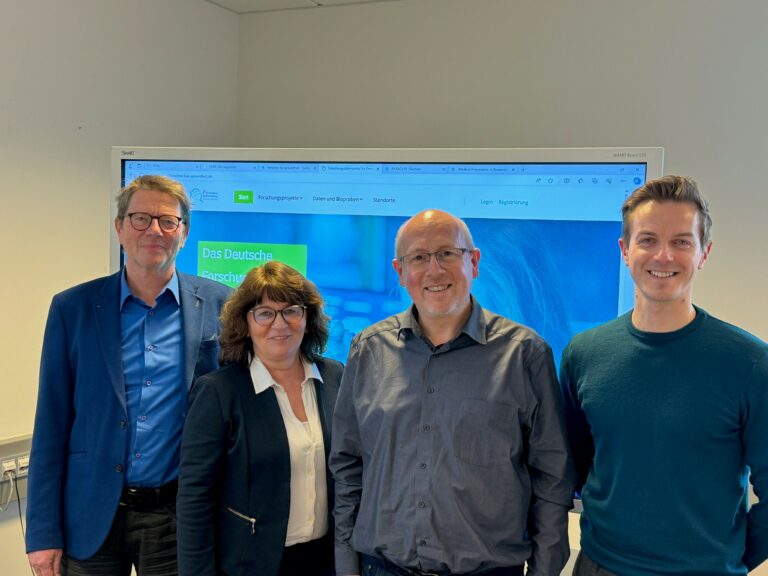On February 8, 2024, medical informatics experts and members of the Bundestag discussed the results of the Medical Informatics Initiative (MII) to date and the impact that the recently passed Health Data Use Act will have on the work of the MII at the Chair of Medical Informatics at Friedrich-Alexander University Erlangen-Nuremberg. The head of the MIRACUM consortium, Prof. Dr. Hans-Ulrich Prokosch, and the holder of the Chair of Medical Data Science, Prof. Dr. Thomas Ganslandt, met with federal policy experts in the field of healthcare policy. The guests were Martina Stamm-Fibich MdB from Erlangen, member of the Health Committee, and Matthias Mieves MdB from Kaiserslautern, member of the Health Committee and Committee for Digital Affairs.
Ulli Prokosch first presented the core results of the MII and introduced the national research data portal for health (FDPG). He pointed out that the infrastructures established by the MII – in particular the distributed, harmonized DIZ and the central FDPG as an access point – can play an important role in the upcoming architecture for connecting Germany to the European Health Data Space (EHDS).
The discussions then focused on the Health Data Utilization Act and the forthcoming Medical Research Act. Both will have a significant impact on research with health data in Germany in the future. The central importance of improving interoperability and data availability for data-driven research was emphasized, as was the important aspect of data quality. Professor Prokosch emphasizes: “We welcome the facilitation of in-house research by healthcare institutions introduced by the Health Data Use Act, and in particular its extension to collaborative research projects.”
Professor Ganslandt adds: “The upcoming binding requirements for interoperability will bring a significant improvement for cross-sector research with healthcare data.”
The need for a close exchange between science and politics to optimize the use of health data for research and to maintain data protection and ethical standards was emphasized by the participants in the discussion. The two members of the Bundestag expressed their gratitude for the insightful information on MII and declared their intention to incorporate the knowledge gained into their future work in health policy. They motivated the Erlangen scientists to continue to support the development of health policy legislation with constructive advice.
Foto: LMI: f.l.t.r.: Prof. Dr. H.-U. Prokosch, M Stamm-Fibich MdB, Prof. Dr. T. Ganslandt, M. Mieves MdB


On February 8, 2024, medical informatics experts and members of the Bundestag discussed the results of the Medical Informatics Initiative (MII) to date and the impact that the recently passed Health Data Use Act will have on the work of the MII at the Chair of Medical Informatics at Friedrich-Alexander University Erlangen-Nuremberg. The head of the MIRACUM consortium, Prof. Dr. Hans-Ulrich Prokosch, and the holder of the Chair of Medical Data Science, Prof. Dr. Thomas Ganslandt, met with federal policy experts in the field of healthcare policy. The guests were Martina Stamm-Fibich MdB from Erlangen, member of the Health Committee, and Matthias Mieves MdB from Kaiserslautern, member of the Health Committee and Committee for Digital Affairs.
Ulli Prokosch first presented the core results of the MII and introduced the national research data portal for health (FDPG). He pointed out that the infrastructures established by the MII – in particular the distributed, harmonized DIZ and the central FDPG as an access point – can play an important role in the upcoming architecture for connecting Germany to the European Health Data Space (EHDS).
The discussions then focused on the Health Data Utilization Act and the forthcoming Medical Research Act. Both will have a significant impact on research with health data in Germany in the future. The central importance of improving interoperability and data availability for data-driven research was emphasized, as was the important aspect of data quality. Professor Prokosch emphasizes: “We welcome the facilitation of in-house research by healthcare institutions introduced by the Health Data Use Act, and in particular its extension to collaborative research projects.”
Professor Ganslandt adds: “The upcoming binding requirements for interoperability will bring a significant improvement for cross-sector research with healthcare data.”
The need for a close exchange between science and politics to optimize the use of health data for research and to maintain data protection and ethical standards was emphasized by the participants in the discussion. The two members of the Bundestag expressed their gratitude for the insightful information on MII and declared their intention to incorporate the knowledge gained into their future work in health policy. They motivated the Erlangen scientists to continue to support the development of health policy legislation with constructive advice.
Foto: LMI: f.l.t.r.: Prof. Dr. H.-U. Prokosch, M Stamm-Fibich MdB, Prof. Dr. T. Ganslandt, M. Mieves MdB